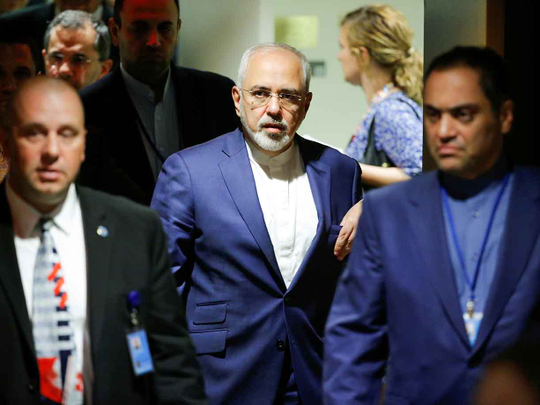
United Nations: Washington and Tehran’s top diplomats confronted each other for the first time Wednesday as envoys scrambled to save the Iran nuclear deal from a sceptical Donald Trump.
US Secretary of State Rex Tillerson and Iran’s Foreign Minister Mohammad Javad Zarif met as parties to the 2015 accord at an EU-hosted event alongside the UN General Assembly.
European ministers called the meeting to examine ways to save a deal that US President Trump is poised to denounce, but Tehran and Washington remain far apart.
EU foreign policy chief Federica Mogherini put the bravest possible face on the encounter, stressing that Iran and the great powers agree the deal is “delivering.”
But Tillerson said the discussion had been a political one and that even if Iran is in “technical” compliance with the pact, “significant differences” remain.
“It was not a technical discussion, it was a political discussion of the political aspects,” Tillerson said.
“So we had a very open and candid exchange between all of the parties to that agreement,” he added, describing the meeting as “useful” but inconclusive.
Deal an ‘embarrassment’
A group comprising Britain, China, France, Germany, Russia and the United States signed a deal with Iran in 2015 to halt Tehran’s alleged search for a nuclear bomb.
Tehran agreed to surrender most of its enriched uranium and place its nuclear sites under UN inspection in return for the lifting of many US and European sanctions.
The previous US administration agreed the deal pertained only to the nuclear issue, and hailed the pact as victory for Barack Obama’s non-proliferation agenda.
But Trump has denounced the deal as an “embarrassment” to the United States and has accused Iran of breaking it in “spirit” by arming militant groups and destabilising the region.
And, in particular, he objects to the “sunset clause” that would see Iran resume some enrichment from 2025.
Tillerson argued that the preamble to the agreement implied that it would lead to a more stable Middle East region and said Iran remains a source of instability.
“Regrettably, since the agreement was confirmed we have seen anything but a more peaceful stable region, and this is a real issue,” he told reporters.
“That’s why we talk about Iran defaulting on these expectations, since those expectations have not been met.”
Tillerson said Iran continues to prop up the “horrible” regime of Syria’s Bashar Al Assad, carry out banned missile tests and harass shipping in the Gulf.
European diplomats, while sharing these concerns, are becoming exasperated by this argument - insisting the accord was designed solely to stop Iran getting the bomb.
“There is no need to renegotiate parts of the agreement because the agreement is concerning a nuclear program and as such is delivering,” Mogherini said.
‘Nuclear crisis’
The European chief diplomat, who chaired the meeting, argued that it would be unwise to re-open the deal at a time when the world is facing a nuclear threat from North Korea.
“We already have one potential nuclear crisis. We definitely do not need to go into another one,” she said.
There was some sympathy for the US position from France, whose President Emmanuel Macron said the deal could be expanded to ban missile tests and cut the sunset clause.
But even he insisted that the core deal not be dumped and the Joint Comprehensive Plan of Action that the deal signatories implemented last year must stay in place.
“We need the 2015 accord,” Macron said. “Is this accord enough? It is not, given the growing pressure that Iran is applying in the region.”
Iran has, however, ruled out renegotiating the accord.
Addressing the UN assembly a day after Trump appeared on the same podium to attack Iran, Rouhani warned the fate of the deal cannot be decided by “one or two countries.”
“It will be a great pity if this agreement were to be destroyed by rogue newcomers to the world of politics. The world will have lost a great opportunity,” he said.
“By violating its international commitments, the new US administration only destroys its own credibility.”
Despite the anger, Tillerson said his first encounter with Zarif had been “matter of fact.”
“It was a good opportunity to meet, shake hands,” the former oil executive said. “There was no yelling, we didn’t throw shoes at one another.
“It was not an angry tone at all. It was a very, very matter of fact exchange about how we see this agreement very differently.”
Trump is due to report to the US Congress on October 15 on whether or not he believes that Iran is in compliance with the nuclear deal.
If, as now appears increasingly likely, he decides that it is not it could open the way for renewed US sanctions and perhaps the collapse of the agreement.
Trump said Wednesday he had made his decision but was not yet ready to reveal it.
Tillerson told reporters he was aware that a decision had been made, but that Trump had even refused to tell British Prime Minister Theresa May what it is.











